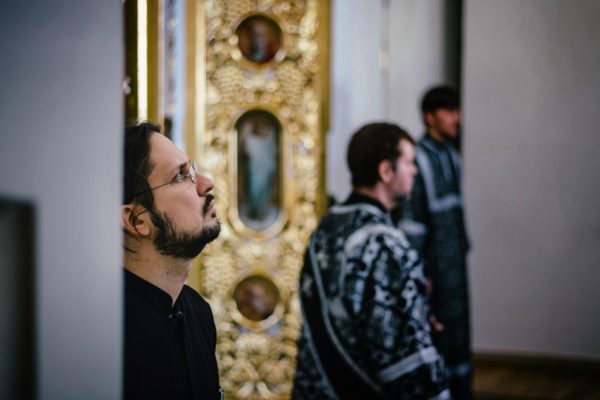Immediately after the Apostle Peter recognizes Jesus as the Christ (something revealed to him from heaven), Peter rebukes Jesus for saying that He must be rejected and killed, (something inspired in Peter by satan). Even the Apostle Peter, even immediately after a heavenly revelation, could not accept that the way we enter into the Father’s Glory, the way we experience the Resurrection, is through suffering and death. Jesus, however, assures us that it is the way. We see the Kingdom of God coming in power by taking up our cross and following Christ (Mark 8:27-9:1).
I am so like Peter. I am sure that there is another way, another way to enter into Glory, a way other than asceticism, a way other than suffering, a way other than the Cross. But Jesus tells us that there is no other way.
Asceticism and suffering are ubiquitous. Life on the earth is often referred to as a valley of tears because suffering is universal. Atheists, Moslems, Christians, agnostics, Jews… It doesn’t matter. Everyone suffers. What then is the difference? What is this mystery that transforms suffering into Glory and Resurrection?
Essential in the Christian understanding of Christ’s suffering is the fact that He suffered voluntarily. That Christ could have said no, that Christ could have called twelve legions of angels, that Christ prayed, “nevertheless, not my will but Yours be done”: these facts are evidence of the voluntary nature of Christ’s suffering. Moreover, Jesus Himself said, “No one takes my life from me. I lay it down of my own accord” (John 10: 17-18). And that Christ’s suffering is voluntary grants us some insight into this mystery of the transformation of suffering into Glory and death into Resurrection.
After all, Jesus does say, “Whoever desires to come after me, let him deny himself.” To follow Christ is something one desires, it is something one chooses, again and again, day by day, moment after moment.
However entering the Father’s Glory is not merely a matter of self-imposed suffering, or suffering for suffering sake. The suffering that leads to Resurrection is not ego driven. It is a suffering that is voluntary, or that can become voluntary, but is not a suffering that is self chosen. Fasting or alms giving are examples of voluntary suffering. However, so that they may not be self chosen, the Church teaches us when and how to fast, to pray and to give. We have spiritual fathers and mothers who guide us in asceticism so that our asceticism is not ego driven. This is one way voluntary suffering (asceticism) is kept from becoming ego driven.
Illness and oppression are other ways suffering is not (usually) self chosen. They are examples of suffering that are unavoidable, yet can become voluntary. When someone is suffering from illness or oppressive circumstances beyond his or her control, suffering is unavoidable and generally not ego driven; but the fact that it can’t be avoided does not mean that it cannot also become voluntary.
What is voluntary is according to our will. What is unavoidable can also become voluntary when we receive it from the Hand of God and offer it back to God. When our whole life becomes an offering to God, then good and bad, pain and joy, peace and disturbance can all become a voluntary offering to God. It does not matter who or what the visible agents of our suffering are. In the case of Our Lord, it was a corrupt Roman judge, an envious religious leadership, and the harsh sentence of execution at the hands of rough and jeering soldiers. But for Jesus, the voluntary nature of his Passion was settled in the Garden. The Cup was from His Father’s Hand. Whoever the visible agents of His passion were, Jesus saw only the will of His Father. His life and sufferings are an offering of love. He entrusted his life to His Father even unto death, a terrible death on the Cross. And the result? Resurrection and salvation for the world.
Similarly, we too can learn to turn our unavoidable suffering into an offering. Like Jesus, the visible agents do not have to be primary to us. The virus, the malformed limbs or organs, the uncontrollable movements of body or mind, and the friends and family that fail us: these are merely the agents, the agents of our crucifixion. And though we cannot call 12 legions of angels, God can, but God doesn’t–or at least God doesn’t send us the angels we expect, the ones that will significantly alter our circumstance. But that doesn’t mean that there are no angels with us, helping, saving us in the midst of our terrible circumstance.
Pain (physical and psychological) doesn’t always subside, broken relationships don’t always mend, circumstances do not always improve. Suffering is unavoidable. Yet we still have will. We still can offer our lives, our whole life, our pain, our disappointment, and our suffering to God. What is unavoidable can be made a voluntary offering to God.
And what is the result? I suggest that the result is the same. The same loving Father of our Lord Jesus is our loving Father. Didn’t Jesus teach us to pray, “Our Father…?” The same Power that raised Jesus from the dead and grants life to the world works today, right now, in us. Didn’t Jesus send the Holy Spirit? And didn’t St. Peter, the same St. Peter from the Gospels, at the end of his life write, “For to this you were called, because Christ also suffered for us, leaving us an example, that you should follow in his steps” (1 Peter 2:21)?

















